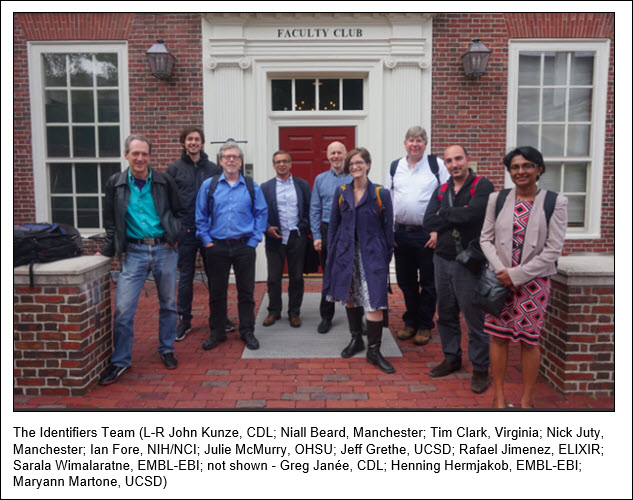EZID Staff in Print: John Kunze and Greg Janée in Scientific Data
CDL’s John Kunze and Greg Janée contributed significantly to this new standard — a harmonized compact identifier system. Congratulations!
—————————————————————–
First big output of FORCE11 Data Citation Implementation Group – the harmonized compact identifier system. Paper published in Scientific Data (Uniform resolution of compact identifiers for biomedical data) which also announces its adoption of this system in accompanying editorial (https://www.nature.com/articles/sdata201895).
Abstract:
Most biomedical data repositories issue locally-unique accessions numbers, but do not provide globally unique, machine-resolvable, persistent identifiers for their datasets, as required by publishers wishing to implement data citation in accordance with widely accepted principles. Local accessions may however be prefixed with a namespace identifier, providing global uniqueness. Such “compact identifiers” have been widely used in biomedical informatics to support global resource identification with local identifier assignment. We report here on our project to provide robust support for machine-resolvable, persistent compact identifiers in biomedical data citation, by harmonizing the Identifiers.org and N2T.net (Name-To-Thing) meta-resolvers and extending their capabilities. Identifiers.org services hosted at the European Molecular Biology Laboratory – European Bioinformatics Institute (EMBL-EBI), and N2T.net services hosted at the California Digital Library (CDL), can now resolve any given identifier from over 600 source databases to its original source on the Web, using a common registry of prefix-based redirection rules. We believe these services will be of significant help to publishers and others implementing persistent, machine-resolvable citation of research data.

Learn more in the Force11 press release — Introducing a New Standard for the Citation of Research Data
About FORCE11
FORCE11 is a non-profit organization and community of scholars, librarians, archivists, publishers and research funders that has arisen organically to help facilitate the change toward improved knowledge creation and sharing. Individually and collectively, we aim to bring about a change in modern scholarly communications through the effective use of information technology. We are a neutral information market, where stakeholders come to the table for an open discussion, on an even playing field, to talk about changing the ways scholarly and scientific information is communicated, shared and used. Learn more and join the FORCE11 community on our website (https://www.force11.org). You may also follow us on Twitter (https://twitter.com/force11rescomm) or connect on Slack (https://force11slack.herokuapp.com/).
